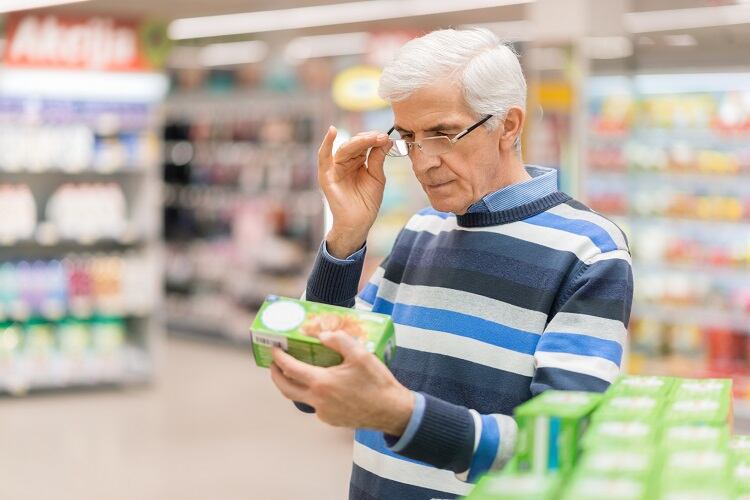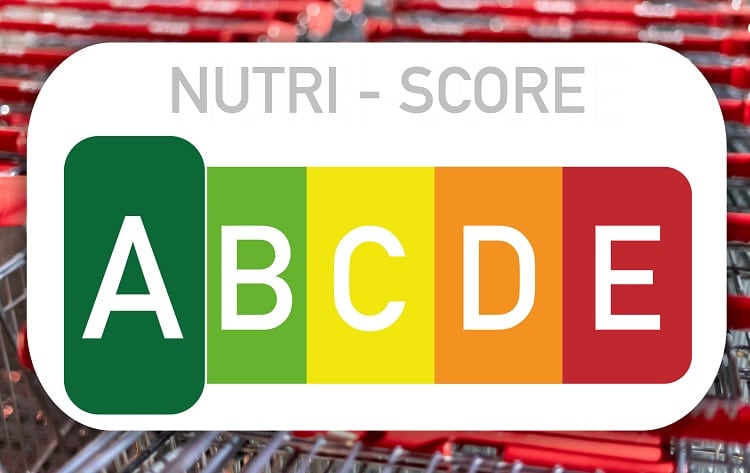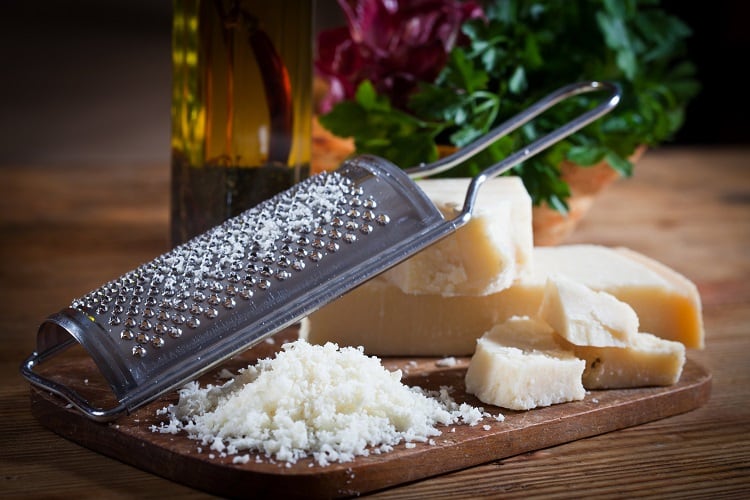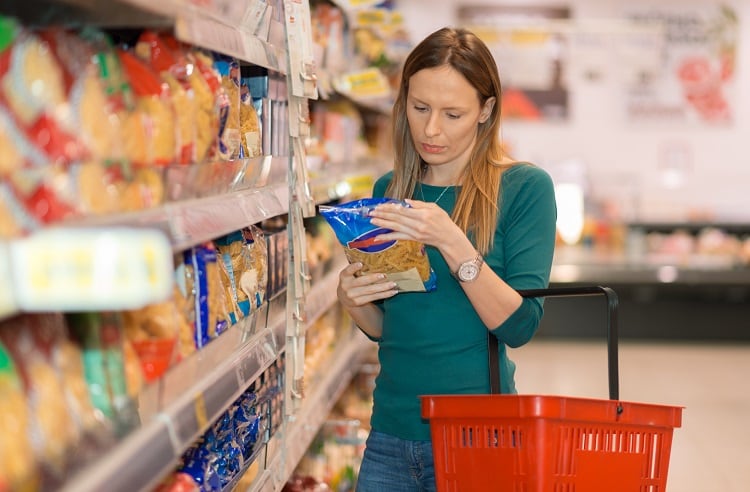Around the world, approximately 11 million deaths in 2017 were attributed to deaths related to unhealthy diets. In an effort to help consumers make healthier food choices, many countries are considering implementing a simplified, interpretive front-of-pack (FOP) labelling system.
The Nutri-Score, developed in France in 2017, is one such example. The labelling scheme aims to influence consumers at the point of purchase to select food products with a better nutritional profile, all the while incentivising food makers to reformulate with nutritional quality in mind.
Now, in a newly published Evidence Summary Brief, titled ‘The Nutri-Score: A Science-Based Front-of-Pack Nutrition Label’, the International Agency for Research on Cancer (IARC) has stressed the superiority of Nutri-Score compared to other nutrition labels, calling for it to be rolled out EU-wide.
“The reduced mortality and cancer risk related to elevated consumption of foods with favourable Nutri-Score ratings has been scientifically established, and it is critical to step up its use in Europe and beyond,” according to Dr Mathilde Touvier, principal investigator of the project and head of the Nutritional Epidemiology Research Team at the French National Institute of Health and Medical Research (Inserm).
Support for Nutri-Score
The Nutri-Score ranks food from -15 for the ‘healthiest’ product to +40 for those that are ‘less healthy’. On the basis of this score, the product receives a letter with a corresponding colour code: from dark green (A) to dark red (F). The algorithm is based on a standard amount (100g) of product.
Since first entering the market around six years ago, Nutri-Score has been adopted by France, Belgium, Spain, Germany, the Netherlands, Luxembourg, Spain and Switzerland.
It is not known whether the nutrition labelling scheme will be rolled out EU-wide, but the European Commission has committed to proposing a mandatory FOP labelling scheme by the end of 2022. What format this label will take has yet to be disclosed.
According to IARC scientist Dr Inge Huybrechts, the co-principal investigator of the project, there is ‘clear scientific evidence’ on the relevance of this labelling system and its potential public health impact at the international level.
“While its adoption by several European Union countries is welcome, a mandatory use of this FOP nutrition label is urgently needed, to help consumers and to make a real difference.”

Scientific evidence
Nutri-Score is based on the British Food Standards Agency nutrient profiling system (modified version), otherwise referred to as FSAm-NPS.
IARC’s stance stems from epidemiological analyses in large-scale prospective cohorts in the diverse European population that have shown that people who consume more foods with higher FSAm-NPS scores – corresponding to less favourable Nutri-Score ratings and lower nutritional quality – have a higher risk of cancer as well as overall and cancer-related mortality.
In the European Prospective Investigation into Cancer and Nutrition (EPIC) study, the association between the nutritional quality of food products consumed and the risk of disease and mortality was examined.
Close to 500 000 adults from 10 different European countries participated in the study for a median period of 15.3 years. During the follow-up, approximately 50 000 were diagnosed with cancer.
Findings revealed that a higher FSAm-NPS DI score of all food items usually consumed by an individual – reflecting the lower nutritional quality of the diet – was consistent with unhealthy dietary intakes.
Participants with the highest FSAm-NPS Dietary Index (DI) scores had a higher risk of developing cancers overall. A higher FSAm-NPS DI score was also associated with a 6% increase in the risk of overall mortality when compared to participants with the lowest FSAm-NPS DI scores.
Not all in favour
Of course, not all in Europe is supporting of the Nutri-Score labelling scheme. Some makers of traditional and single-ingredient products have raised concerns that the Nutri-Score algorithm misleads and deceives consumers.
Most recently, the consortia of two of Italy’s most famous protected designation of origin (PDO) products, Parmigiano Reggiano and Grana Padano, have said they will refuse to approve labels incorporating traffic light schemes.
This is largely due to Nutri-Score’s algorithm based on 100g quantities, which pushes the cheeses’ ratings up to ‘orange’. Yet the consortia argue that the average quantity of Parmigiano Reggiano or Grana Padano varies from 20g to 40g.
Other producers against Nutri-Score include members of the European olive oil industry. Under the Nutri-Score system, olive oil receives a ‘yellow C’ rating, which olive oil producers say does not take into account the health benefits of the product.

Others in Europe aren’t necessarily against Nutri-Score’s algorithm, but don’t want to see the labelling scheme become mandatory across the bloc.
Sweden, for example, appears very happy with its voluntary keyhole logo. The label, developed more than 30 years ago, is carried by products that adhere to the scheme’s standards on fat, sugar, salt, fibre, and whole grain content.
The Swedish National Food Agency believes the keyhole labelling scheme is well adapted to the region’s food habits and food-based dietary guidelines, and would prefer to keep the scheme in place rather than bring in a mandatory alternative, such as Nutri-Score.
Support for mandatory EU-wide rollout
On the other side of the coin, the IARC is far from the only voice pushing for a mandatory EU-wide labelling scheme in the vein of Nutri-Score.
Serge Hercberg, president of France’s national health and nutrition programme (PNNS), and co-author of the EPIC study, is also a strong advocate for the scheme to be rolled out across the bloc.
“By helping steer consumers, in a simple and understandable way, toward foods with a better and healthier nutritional composition – while at the same time, pushing manufacturers to improve the nutritional composition of their productions through reformulation – Nutri-Score contributes to improving the diet of populations,” Herberg told FoodNavigator.
Such diets are consistent with diets associated with lower risk of chronic diseases, he continued, ‘especially cancer’, as demonstrated by the epidemiological assessments.
For this reason, the researcher is convinced Nutri-Score is the best nutrition labelling scheme in Europe. “Its construction relies on robust scientific observations, including data from more than 50 studies published in international peer-reviewed scientific journals, which have validated its calculation method and its graphic format, and demonstrated its effectiveness and its superiority compared to other labels that have been implemented in other countries or supported by food industry-aligned lobbying groups.”
Nutri-Score is the only proposed labelling scheme that adheres completely to concepts and processes that were published by the World Health Organization (WHO) Europe concerning validation studies required to select and evaluate an FOP nutrition label, he told this publication.
“Yes, to be more efficient, Nutri-Score has to be affixed to all products on the market. To force food manufacturers that continue to refuse to provide consumers real transparency on the nutritional values of the products,” he stressed, citing FMCGs such as Ferrero, Coca-Cola, Mars, Mondelēz, Unilever, and Lactalis, “it is necessary to make Nutri-Score mandatory in Europe.”
Source: The BMJ
‘Association between nutritional profiles of food underlying Nutri-Score front-of-pack labels and mortality: EPIC cohort study in 10 European countries’
Published 16 September 2020
DOI: https://doi.org/10.1136/bmj.m3173
Authors: Mélanie Deschaseaux, Inge Huybrechts, Changal Julia, Serge Hercberg, Mathilde Touvier, et al.




